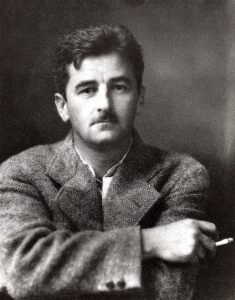Books By William Faulkner
- Soldier’s Pay (1926) – standalone
- Mosquitoes (1927) – standalone
- Sartoris (1929) – standalone
- The Sound and the Fury (1929) – standalone
- As I Lay Dying (1930) – standalone
- Sanctuary (1931) – standalone
- Light in August (1932) – standalone
- Pylon (1935) – standalone
- Absalom, Absalom! (1936) – standalone
- The Unvanquished (1938) – standalone
- The Wild Palms (1939) – standalone
- The Hamlet (1940) – Snopes Trilogy
- Go Down, Moses (1942) – standalone
- Intruder in the Dust (1948) – standalone
- Requiem for a Nun (1951) – standalone
- A Fable (1954) – standalone
- The Town (1957) – Snopes Trilogy
- The Mansion (1959) – Snopes Trilogy
- The Reivers (1962) – standalone
About William Faulkner
 William Faulkner, born on September 25, 1897, in New Albany, Mississippi, was an American novelist and short story writer renowned for his intricate narrative style and deep exploration of the complexities of the human condition, particularly in the American South. Faulkner is widely regarded as one of the most important figures in 20th-century American literature, and his works are celebrated for their profound insights into the social, psychological, and moral struggles of individuals and communities.
William Faulkner, born on September 25, 1897, in New Albany, Mississippi, was an American novelist and short story writer renowned for his intricate narrative style and deep exploration of the complexities of the human condition, particularly in the American South. Faulkner is widely regarded as one of the most important figures in 20th-century American literature, and his works are celebrated for their profound insights into the social, psychological, and moral struggles of individuals and communities.
Faulkner’s literary career began in the 1920s with the publication of his first novel, “Soldier’s Pay” (1926), followed by “Mosquitoes” (1927) and “Sartoris” (1929). However, it was with his fourth novel, “The Sound and the Fury” (1929), that Faulkner gained widespread recognition for his innovative narrative techniques, including stream-of-consciousness and nonlinear storytelling.
Throughout his career, Faulkner continued to experiment with narrative form and structure, producing works such as “As I Lay Dying” (1930), “Light in August” (1932), and “Absalom, Absalom!” (1936), which are now considered classics of American literature. His exploration of themes such as race, class, gender, and the decline of the Old South earned him critical acclaim and a lasting legacy in literary history.
Faulkner’s fictional Yoknapatawpha County, inspired by his native Mississippi, served as the backdrop for many of his novels and short stories, providing a richly detailed and evocative setting for his exploration of Southern history and culture. His vivid portrayal of the region’s landscapes and characters, often steeped in the complexities of family dynamics and social hierarchies, captured the imagination of readers and critics alike.
Despite facing initial commercial failure, Faulkner’s literary reputation grew steadily over the years, culminating in his receipt of the Nobel Prize in Literature in 1949, awarded “for his powerful and artistically unique contribution to the modern American novel.” Faulkner’s profound influence on subsequent generations of writers and his enduring legacy as a master of American fiction continue to be celebrated and studied by readers, scholars, and literary enthusiasts worldwide.

